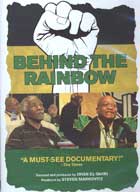
Behind the Rainbow 2009
Distributed by Icarus Films, 32 Court St., 21st Floor, Brooklyn, NY 11201; 800-876-1710
Produced by Steven Markovitz and Jihan El-Tahri
Directed by Jihan El-Tahri
DVD, color, 138 min.
Sr. High - Adult
African Studies, Political Science
Date Entered: 02/11/2011
Reviewed by Wendy Highby, University of Northern ColoradoBehind the Rainbow chronicles the politics and government of South Africa in the post-apartheid years. It covers the recent leadership history of South Africa by its ruling party, the African National Congress (ANC). The film spans the presidential succession of the last two decades, from Nelson Mandela’s release in 1990 and his election in 1994, through the era of Thabo Mbeki, up to the ascendancy of Jacob Zuma. But this is no routine primer of presidential history. Writer and director Jihan El-Tahri provides a strong narrative theme—what happens when a liberation movement transitions into an established government? Can it retain and implement its ideals of equality and justice? El-Tahri traces the dramatic arc of a political movement. She presents a work of complexity, an engaging political history. The documentary contains archival footage and excerpts from political conventions. Both emotion and substantive content are conveyed in candid interviews with Presidents Zuma and Mbeki, government and party officials, and political scientist Achille Mbembe.
The first half of the film sets the context, briefly describing the history of the ANC and the exile of its leaders. It then focuses upon events of the 1990s: the unbanning of the ANC, Nelson Mandela’s presidency, and the compromises made with the pre-apartheid government. Documentarian El-Tahri delves into the economic policies of Mandela and Mbeki’s’s post-apartheid government. Rather than holding to its anti-poverty ideals, the new government undertakes a market-oriented policy. State assets are privatized and social spending is reduced. While the economic growth rate is healthy, unemployment skyrockets. In effect, privilege is de-racialized, but poverty is not. The black economic empowerment program benefits only a small elite. The new regime is plagued with tensions between technocrats and trade unions, and hobbled by a lack of social service infrastructure.
The second half of the film focuses upon the post-Mandela years and vicissitudes in the political careers of former President Mbeki and current President Zuma. Questionable defense spending policies are implemented and Zuma becomes embroiled in an arms deal controversy and other scandals. ANC loyalty splits between Mbeki and Zuma. Nostalgia surfaces for the good old days of the liberation movement and opposition parties rise in response to the disillusionment with the ANC.
While the film provides an engrossing view of political personalities, it also sheds light on the complex processes of policy formation and political compromise. This richly-detailed documentary captures a unique span of recent history. El-Tahri’s film will inform and engage students of political science and African studies. It has much to teach about liberation movements, presidential succession, public opinion, party politics, and political power.